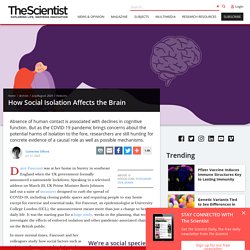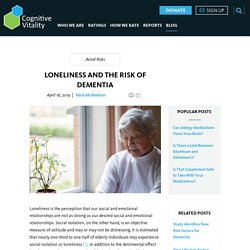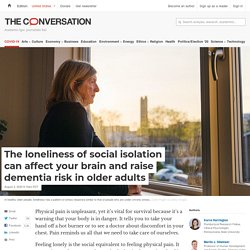

The number of lonely people are increasing, a study by AARP research shows that, 1 in 3 adults aged 45 years old and above are lonely (Frank, 2018).
The effect of loneliness can be detrimental to individuals' health. In this collection, we will examine how loneliness influences people in late adulthood.
References
Frank, D. (2018, September 26). 1 in 3 U.S. Adults are Lonely, AARP Foundation Survey Finds. C. (1998). Loneliness: an epidemic in modern society. Journal of advanced nursing, 28(4), 762-770.
Loneliness and Health in Older Adults. Development in Late Adulthood. Social Isolation and Loneliness in Older Adults: Opportunities for the Health Care System. Social isolation, loneliness in older people pose health risks.
Loneliness and cognitive function in the older adult. Loneliness & Isolation. How Social Isolation Affects the Brain. Daisy Fancourt was at her home in Surrey in southeast England when the UK government formally announced a nationwide lockdown.

Speaking in a televised address on March 23, UK Prime Minister Boris Johnson laid out a suite of measures designed to curb the spread of COVID-19, including closing public spaces and requiring people to stay home except for exercise and essential tasks. For Fancourt, an epidemiologist at University College London (UCL), the announcement meant more than just a change to her daily life. It was the starting gun for a huge study, weeks in the planning, that would investigate the effects of enforced isolation and other pandemic-associated changes on the British public. We’re a social species. We really need others to survive. Alzheimer's Drug Discovery Foundation. Loneliness is the perception that our social and emotional relationships are not as strong as our desired social and emotional relationships.

Social isolation, on the other hand, is an objective measure of solitude and may or may not be distressing. Health consequences of social isolation and loneliness. Personality social support and loneliness among centenarians: a. The loneliness of social isolation can affect your brain and raise dementia risk in older adults. Physical pain is unpleasant, yet it’s vital for survival because it’s a warning that your body is in danger.

It tells you to take your hand off a hot burner or to see a doctor about discomfort in your chest. Pain reminds us all that we need to take care of ourselves. Feeling lonely is the social equivalent to feeling physical pain. It even triggers the same pathways in the brain that are involved in processing emotional responses to physical pain. Just like feeling physical pain, feeling lonely and disconnected from others is also a signal that we need to take care of ourselves by seeking the safety and comfort of companionship.
As scholars at the Center for Healthy Aging at Penn State, we study the impact of stress on the aging body and brain, including how it can worsen cognitive decline and risk for dementia. The health consequences of loneliness The COVID-19 pandemic has put many older adults’ social lives on hold, leaving them at greater risk for loneliness. Coronavirus: Elderly hit hard by social isolation amid circuit breaker measures, Health News. A needle and the television set - these two objects have been keeping 83-year-old Nellie Woo company from morning to night for the past week while she is holed up alone at home.
She used to enjoy playing bingo and exercising with her elderly neighbours at the Senior Activity Centre (SAC) downstairs, as well as chatting with volunteers who visited her studio flat. Now that all activities for seniors - including home visits - have ceased due to strict circuit breaker measures, Madam Woo is feeling lonely and emotionally down. She thinks about suicide sometimes, and has spent so much time staring at her patchwork and TV lately that her doctor had to give her antibiotics for dry eyes. For such elderly people, the ills that come with social isolation pose a significant health risk, say some seniors and social workers.
Out of the 208,000 people who live alone in Singapore, at least a quarter of them are elderly. In 2016, there were 47,000 seniors aged 65 and above who lived by themselves. Seniors felt less socially satisfied, more isolated during Covid-19 circuit breaker period: Survey, Singapore News. SINGAPORE - Social isolation during the circuit breaker period resulted in lower social satisfaction levels for senior citizens, according to results from a monthly survey of about 7,500 people aged between 55 and 75 here. Social satisfaction levels dipped by about 4 per cent in May when compared with data from January. In particular, for senior citizens living with others, satisfaction levels fell to the pre-circuit breaker levels of peers living alone, while those living alone saw even lower satisfaction levels as safe distancing measures made it more difficult to find support from friends and the community.
As of July, while satisfaction levels have rebounded after the circuit breaker period, which was from April 7 to June 1, they are not back to the levels they were at before. As Singapore's population ages, the proportion of those who remain single and live alone will increase, said Prof Straughan, a sociologist and former Nominated Member of Parliament. Seniors Isolation Infographic. 10 Ways to Help Seniors Deal with Isolation and Depression – DailyCaring. Many seniors go through major life changes that could make them more vulnerable to depression.

But it’s heartbreaking to stand by and watch someone deal with depression or loneliness on their own. Zara Lewis shares 10 ways you can help your older adult cope with symptoms and improve their quality of life. According to WHO estimates, depression affects about 350 million people of all ages worldwide. While coping with depression is tough, it’s even more difficult to watch an aging family member struggle with it. As my depressed mother-in-law’s caregiver, I’ve come up with a list of tips I wish to share with other caregivers to make it easier for them to help their older adult deal with isolation and depression. 1. Many seniors who live alone are prone to sleeping problems which can aggravate depression. If the person suffers from sundowning or sleep disorder, keep engaging activities or necessary medication close at hand. 2. 3. 4. Ways to reduce stress for caregivers. Survival tips from caregivers.